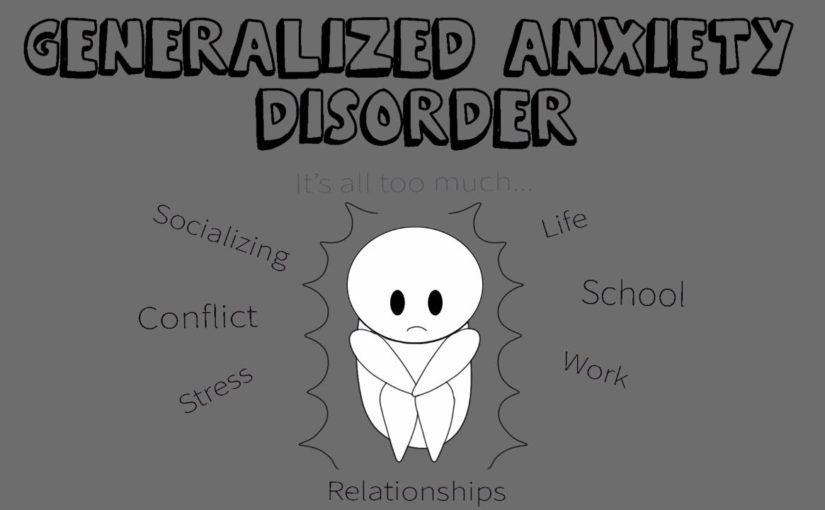[Music] hi everyone we it’s like to go would love to thank you for making us a digital family of more than 2 million it’s with your continued support that we’re able to bring you new content regularly our mission is to help everyone become more self aware of the various psychological factors that affect our lives one such factor that we hear about on a daily basis is anxiety but it’s important to know when it’s anxiety only and wanted to become something more so let’s find out anxiety in general is our normal reaction to stress in fact it can be a good thing anxiety motivates you to accomplish your assignments to study harder for a test and it can warn you when you’re in a dangerous situation it informs you to be extra vigilant about your environment the fight or flee generalized anxiety disorder or GED on the other hand is a full-fledged anxiety disorder that involves intense and excessive anxiety as a key factor along with other debilitating symptoms differentiating between normal anxiety and generalized anxiety disorder or di D can be tricky how do you know especially if you’re a little more anxious than others whether or not your anxiety is significant enough to qualify as a disorder so let’s begin with an introduction to the main concepts revolving around the – one normal anxiety is more of a friend than a foe according to the anxiety and depression Association of America anxiety is a normal and often healthy emotion which is characterized by feelings of tension worried thoughts and physical changes like increased blood pressure when we face potentially harmful or worrying triggers feelings of anxiety are not only normal but necessary for survival since the earliest days the approach of predators an incoming danger set off alarms in the body and allowed evasive action these alarms were in the form of a raised heartbeat sledding and increased sensitivity to surroundings danger causes a rush of adrenaline a hormone in the brain which in turn triggers the anxious reactions in a process called the fight-or-flight response this prepares humans to physically confront or flee any potential threats to sea all these are classic characteristics of normal anxiety such traits came in handy for our predecessors but we don’t have to be in a constant state of fight-or-flight anymore so running from larger animals is a less pressing concern in present times than it would have been for early humans anxieties now revolve around work money family life health and other crucial issues that demand a person’s attention without necessarily requiring the fight-or-flight reaction the nervous feeling before an important life event are during a difficult situation is a natural echo of the original fight-or-flight reaction it can still be essential to survival anxiety about being hit by a car when crossing the street for example means that a person will instinctively look both ways to avoid danger when the duration or severity of an anxious feeling is out of proportion to the original trigger or stressor physical symptoms such as increased blood pressure and nausea may also develop these responses are what moved normal anxiety beyond into gid generalized anxiety disorder GA D is when the trouble starts generalized anxiety disorder involves persistent and excessive worry that interferes with daily activities people with symptoms of GA D tend to always expect disaster and can stop worrying about health money family work or school in people with GID the worry is often unrealistic or out of proportion from the situation daily life becomes a constant state of worry fear and dread eventually the anxiety so dominates the person’s thinking that it interferes with daily functioning including work school social activities and relationships there are several key differences that make them distinguishable here are a few ways you can tell the two apart one presence of a stressor usually a normal anxiety occurs in response to a stressor such as an exam an upcoming interview a fight with a friend or a new job when you struggle with GID you’re anxious most or almost all of the time even when you can’t spot the source of the stress for instance people a generalized anxiety disorder can have a difficult time just getting through the day even seemingly small responsibilities like paying the bills make them feel anxious – intensity and length gid produces intense and excessive emotional responses even if you’re reacting to a stressor your anxiety is disproportionate to that stressor many people are on the edge before an exam but a person with jad might be anxious several weeks beforehand and will experience intense symptoms right before and during the exam also normal anxiety is fleeting while gid is ongoing and the feelings can last weeks or months three physical symptoms of jad excessive anxiety and wary aren’t the only symptoms that accompany GID there are physical symptoms – dizziness lightheadedness sweating trembling heart pounding headaches and nausea you feel like you can’t breathe can’t talk or have to go to the bathroom frequently people at jad also report feeling detachment and disconnected from reality they feel like they can’t think straight and have difficulty concentrating psychological symptoms are also present individuals experience racing or negative thoughts and are unable to concentrate and have worries about day to day things or impairment when you struggle with GID it affects your entire life it impairs or interferes with your schoolwork job and daily life avoidance is a symptom of jad and can be quite debilitating in other words excessive anxiety can cause you to avoid normal activities you might skip class miss a test stop going to work procrastinate grocery shopping or avoid anything that makes you feel anxious and 5 no control most people can reduce and control their anxiety through a variety of coping techniques and the ability to calm oneself however people at GID have significant difficulty finding relaxation calm and time away from their worries if you have more difficulty than other people you know in controlling your anxiety it may be more than normal anxiety did you often find yourself confused about these two conditions do these factors easier to differentiate between the two do let us know in the comments below if you are struggling with overwhelming anxiety and you can relate to some of these factors don’t hesitate to seek help from a mental health professional and subsequent treatment also remember to share this video with someone you think might benefit from these as well don’t forget to click the like button and subscribe for more content as always thanks for watching
 As found on YouTubeSeanCooper🗯
As found on YouTubeSeanCooper🗯 The Shyness & Social Guy ⇝ The 3 WORST Mistakes You Must AVOID If You Want To Overcome Shyness (PLUS: 1 weird trick that targets the root biological cause of shyness so you can stop being nervous, awkward, and quiet around people…) By Sean Cooper,
The Shyness & Social Anxiety Guy. The fact that you’re reading this article tells me you may have already reached a point where you feel your shyness is NOT going away on its own… or you fear it’s getting worse and worse. And I don’t want you to waste one more day living a life where you feel left out, bored, or depressed because you don’t have the relationships which would make you happy. That’s why I’ve put together this page to help you avoid the worst mistakes that keep many people stuck with shyness for years… often giving up hope of ever improving as you watch other people have interesting “normal” lives without you. Yet this doesn’t have to happen.

 As found on YouTubeSeanCooper🗯 The Shyness & Social Guy ⇝ The 3 WORST Mistakes You Must AVOID If You Want To Overcome Shyness (PLUS: 1 weird trick that targets the root biological cause of shyness so you can stop being nervous, awkward, and quiet around people…) By Sean Cooper, The Shyness & Social Anxiety Guy. The fact that you’re reading this article tells me you may have already reached a point where you feel your shyness is NOT going away on its own… or you fear it’s getting worse and worse. And I don’t want you to waste one more day living a life where you feel left out, bored, or depressed because you don’t have the relationships which would make you happy. That’s why I’ve put together this page to help you avoid the worst mistakes that keep many people stuck with shyness for years… often giving up hope of ever improving as you watch other people have interesting “normal” lives without you. Yet this doesn’t have to happen.
As found on YouTubeSeanCooper🗯 The Shyness & Social Guy ⇝ The 3 WORST Mistakes You Must AVOID If You Want To Overcome Shyness (PLUS: 1 weird trick that targets the root biological cause of shyness so you can stop being nervous, awkward, and quiet around people…) By Sean Cooper, The Shyness & Social Anxiety Guy. The fact that you’re reading this article tells me you may have already reached a point where you feel your shyness is NOT going away on its own… or you fear it’s getting worse and worse. And I don’t want you to waste one more day living a life where you feel left out, bored, or depressed because you don’t have the relationships which would make you happy. That’s why I’ve put together this page to help you avoid the worst mistakes that keep many people stuck with shyness for years… often giving up hope of ever improving as you watch other people have interesting “normal” lives without you. Yet this doesn’t have to happen. 



